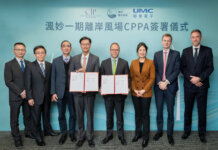Advancing efforts to build a skilled, diverse and equitable offshore wind workforce in the commonwealth, the Baker-Polito administration has released a new report assessing the workforce strengths, gaps and opportunities in Massachusetts for the emerging industry.
The report, sponsored by the Massachusetts Clean Energy Center and authored by BW Research Partnership, analyzes offshore wind workforce development in the Northeast with a specific focus on Massachusetts.
The release of the report was announced by Gov. Charlie Baker, Lt. Gov. Karyn Polito, Energy and Environmental Affairs Secretary Kathleen Theoharides, and state and local officials at the New Bedford Marine Commerce Terminal as part of Climate Week in Massachusetts. During the event, Gov. Baker also highlighted his plan to invest $100 million in critical port infrastructure through the administration’s proposal to put federal COVID relief funding to immediate use in cities and towns across the Commonwealth.
“As Massachusetts prepares for the construction of the first commercial scale offshore wind project in the nation, our administration is focused on ensuring our workforce is trained and ready, and offers pathways to employment for all residents, especially in the communities that can most benefit from this generational economic opportunity,” says Gov. Baker. “To ensure we maximize the economic potential of this industry and build on assets like the New Bedford Marine Commerce Terminal, our administration is proposing a significant investment in critical port infrastructure to meet the scale of offshore wind development in the Northeast and help us achieve our ambitious climate goals.”
“Our administration is at the forefront of developing crucial workforce training capacity and opportunities here in Massachusetts,” comments Lt. Gov. Polito. “As we focus on developing a highly-skilled workforce, we will continue to prioritize equity and diversity, access to opportunity, and the availability of critical safety training our workers will need to build the nation-leading Vineyard Wind project.”
The workforce study provides an overview of the existing, relevant regional training programs, including grantees awarded under MassCEC’s 2018 and 2020 workforce development awards. The analysis also examines the workforce needed to achieve Massachusetts’ ambitious offshore wind goals, and the state’s ability to supply the necessary workers.
Furthermore, the report includes a focus on priority communities in which to focus workforce development efforts based on equity, need and current workforce supply. The findings of this report will help inform the administration’s offshore wind workforce efforts over the next several years. It has already been used by MassCEC to develop a career pathway mapping tool on its Careers Training and Education Directory.
The study also highlights the administration’s work to establish the Commonwealth as a national leader in the development of offshore wind-specific training, with seven of the 12 training programs operating in the Northeast located in Massachusetts.
“Offshore wind is the anchor for the Baker-Polito Administration’s strategy to reach net zero emissions by 2050, offering Massachusetts an opportunity to produce clean energy while creating a new economic engine that will lead to jobs and investment in the South Coast and other regions across the Commonwealth,” said Secretary Theoharides. “As we leverage our network of educational institutions and work together to develop a diverse, inclusive workforce, we must also make smart, timely investments in our port assets so Massachusetts can capitalize on the economic potential of this industry in the Northeast market.”
The report from MassCEC and BW Research Partnership follows and builds upon a 2018 offshore wind workforce assessment by MassCEC in partnership with UMass Dartmouth, Bristol Community College and the Massachusetts Maritime Academy. That study reviewed the economic impact associated with 1,600 MW of offshore wind and found an anticipated direct economic impact of $600-$800 million and a total economic impact of $1.4-$2.1 billion. Since that report was released the state’s commitment to offshore wind has grown to 5,600 MW, increasing the potential economic opportunity.
“Bristol Community College is proud to play a key role in training Massachusetts workers and supporting the development of a diverse, equitable and inclusive offshore wind industry in the Southcoast region,” states Dr. Laura L. Douglas, president of Bristol Community College. “In collaboration with our partners, Bristol’s National Offshore Wind Institute will provide our region with the most in-demand technical skills and safety training required for high-paying careers in this emerging industry.”
During this year’s Climate Week in Massachusetts, the Baker-Polito Administration is highlighting its commitment to reducing emissions, mitigating the impacts of climate change and building a more resilient Commonwealth. Throughout Climate Week, the administration is holding events to spotlight important initiatives including offshore wind, land protection and conservation, the Greening the Gateway Cities program and the expansion of clean energy in the Commonwealth. The administration is also highlighting the urgent demand for funding to support climate resiliency in Massachusetts, and Gov. Baker’s plan to immediately put to use part of Commonwealth’s direct federal aid from the American Rescue Plan Act to support critical priorities in cities and towns. The administration’s plan would commit $900 million to key energy and environmental initiatives, including $700 million to support water infrastructure upgrades and climate resiliency, and $100 million to invest in port infrastructure to support the offshore wind industry.
View the full report here.




